Analyzing Socrates & Cicero's Views on Death: A Philosophical Essay
VerifiedAdded on 2023/01/11
|7
|2542
|39
Essay
AI Summary
This essay explores the contrasting views of Socrates and Cicero on death, drawing from Plato's "The Apology" and Cicero's "Tusculanae Disputationes." Socrates, facing his own death, argues that fearing death is unwise as its nature is unknown and may even be a peaceful sleep or a transition to a better place. He prioritizes doing what is right over avoiding death. Cicero, while acknowledging death's inevitability, views it as evil, focusing on the loss of life's pleasures. The essay analyzes their arguments, highlighting Socrates' belief in the immortality of the soul and Cicero's emphasis on the learned fear of death. The author ultimately aligns with Socrates' perspective, finding his approach more positive and relatable, arguing that one cannot fear what they do not know.
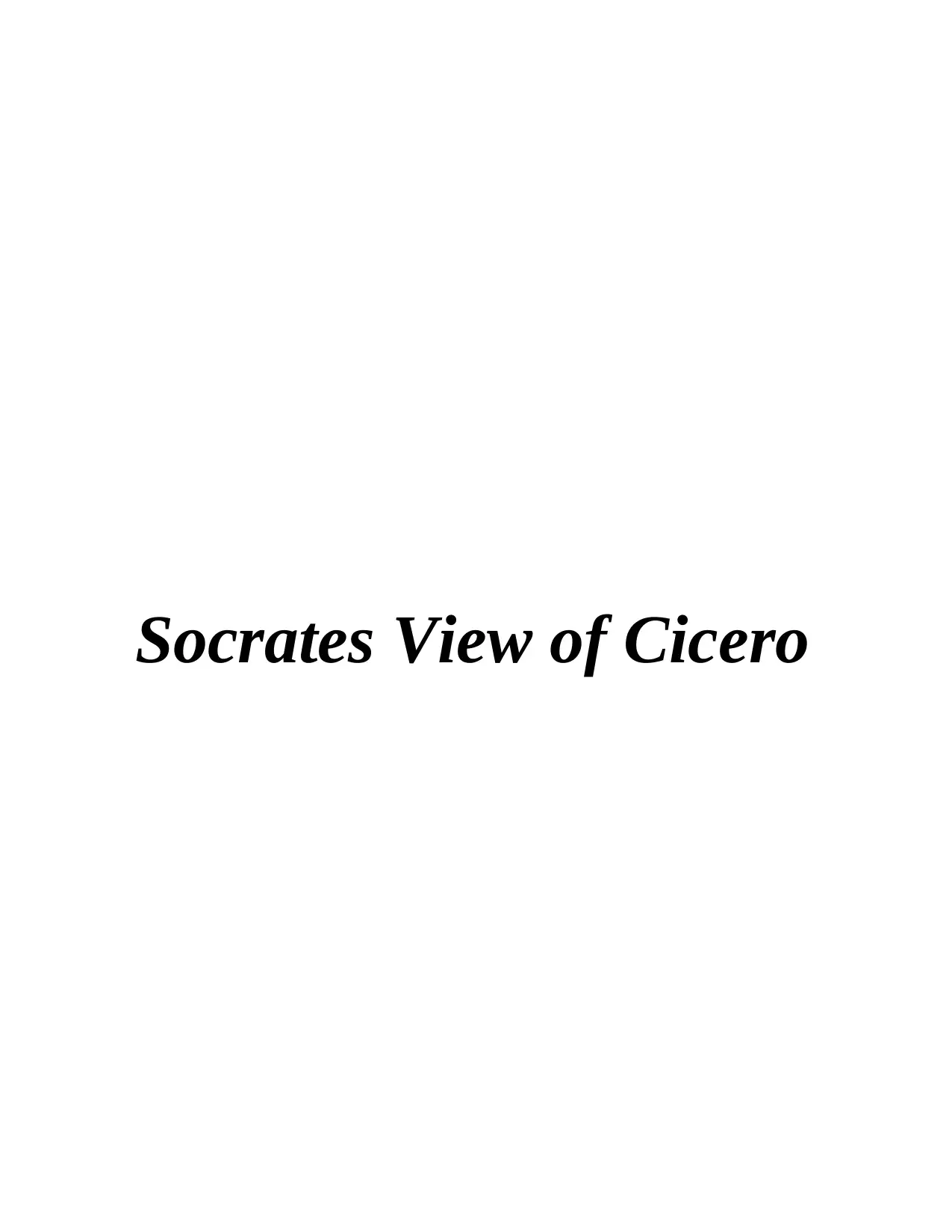
Socrates View of Cicero
Paraphrase This Document
Need a fresh take? Get an instant paraphrase of this document with our AI Paraphraser

Contents
Socrates claims that he does not fear death. Summarize Cicero’s “Against Fear of Death” and relate it
to Socrates’ view. Where do you stand in this debate?............................................................................3
REFERENCES..........................................................................................................................................7
Socrates claims that he does not fear death. Summarize Cicero’s “Against Fear of Death” and relate it
to Socrates’ view. Where do you stand in this debate?............................................................................3
REFERENCES..........................................................................................................................................7
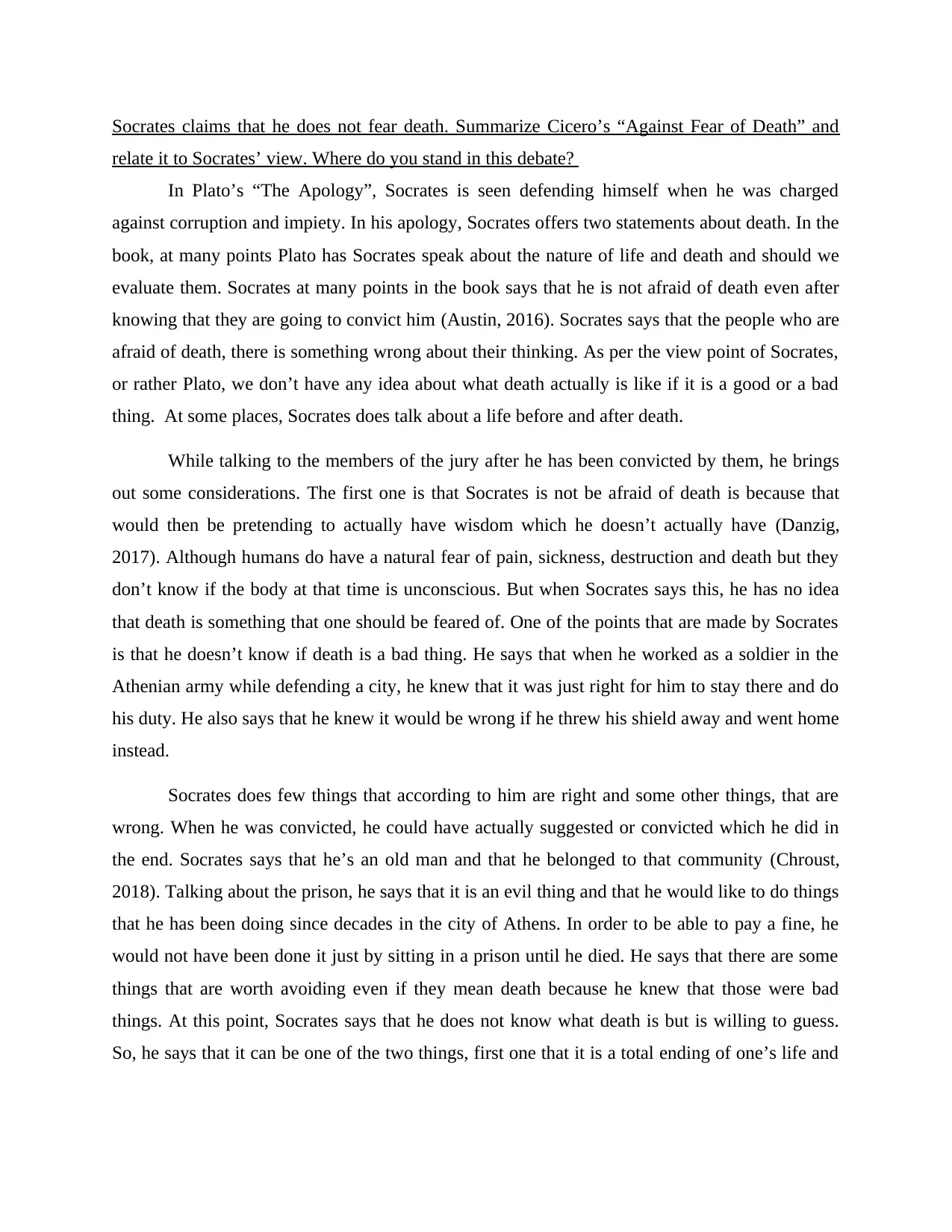
Socrates claims that he does not fear death. Summarize Cicero’s “Against Fear of Death” and
relate it to Socrates’ view. Where do you stand in this debate?
In Plato’s “The Apology”, Socrates is seen defending himself when he was charged
against corruption and impiety. In his apology, Socrates offers two statements about death. In the
book, at many points Plato has Socrates speak about the nature of life and death and should we
evaluate them. Socrates at many points in the book says that he is not afraid of death even after
knowing that they are going to convict him (Austin, 2016). Socrates says that the people who are
afraid of death, there is something wrong about their thinking. As per the view point of Socrates,
or rather Plato, we don’t have any idea about what death actually is like if it is a good or a bad
thing. At some places, Socrates does talk about a life before and after death.
While talking to the members of the jury after he has been convicted by them, he brings
out some considerations. The first one is that Socrates is not be afraid of death is because that
would then be pretending to actually have wisdom which he doesn’t actually have (Danzig,
2017). Although humans do have a natural fear of pain, sickness, destruction and death but they
don’t know if the body at that time is unconscious. But when Socrates says this, he has no idea
that death is something that one should be feared of. One of the points that are made by Socrates
is that he doesn’t know if death is a bad thing. He says that when he worked as a soldier in the
Athenian army while defending a city, he knew that it was just right for him to stay there and do
his duty. He also says that he knew it would be wrong if he threw his shield away and went home
instead.
Socrates does few things that according to him are right and some other things, that are
wrong. When he was convicted, he could have actually suggested or convicted which he did in
the end. Socrates says that he’s an old man and that he belonged to that community (Chroust,
2018). Talking about the prison, he says that it is an evil thing and that he would like to do things
that he has been doing since decades in the city of Athens. In order to be able to pay a fine, he
would not have been done it just by sitting in a prison until he died. He says that there are some
things that are worth avoiding even if they mean death because he knew that those were bad
things. At this point, Socrates says that he does not know what death is but is willing to guess.
So, he says that it can be one of the two things, first one that it is a total ending of one’s life and
relate it to Socrates’ view. Where do you stand in this debate?
In Plato’s “The Apology”, Socrates is seen defending himself when he was charged
against corruption and impiety. In his apology, Socrates offers two statements about death. In the
book, at many points Plato has Socrates speak about the nature of life and death and should we
evaluate them. Socrates at many points in the book says that he is not afraid of death even after
knowing that they are going to convict him (Austin, 2016). Socrates says that the people who are
afraid of death, there is something wrong about their thinking. As per the view point of Socrates,
or rather Plato, we don’t have any idea about what death actually is like if it is a good or a bad
thing. At some places, Socrates does talk about a life before and after death.
While talking to the members of the jury after he has been convicted by them, he brings
out some considerations. The first one is that Socrates is not be afraid of death is because that
would then be pretending to actually have wisdom which he doesn’t actually have (Danzig,
2017). Although humans do have a natural fear of pain, sickness, destruction and death but they
don’t know if the body at that time is unconscious. But when Socrates says this, he has no idea
that death is something that one should be feared of. One of the points that are made by Socrates
is that he doesn’t know if death is a bad thing. He says that when he worked as a soldier in the
Athenian army while defending a city, he knew that it was just right for him to stay there and do
his duty. He also says that he knew it would be wrong if he threw his shield away and went home
instead.
Socrates does few things that according to him are right and some other things, that are
wrong. When he was convicted, he could have actually suggested or convicted which he did in
the end. Socrates says that he’s an old man and that he belonged to that community (Chroust,
2018). Talking about the prison, he says that it is an evil thing and that he would like to do things
that he has been doing since decades in the city of Athens. In order to be able to pay a fine, he
would not have been done it just by sitting in a prison until he died. He says that there are some
things that are worth avoiding even if they mean death because he knew that those were bad
things. At this point, Socrates says that he does not know what death is but is willing to guess.
So, he says that it can be one of the two things, first one that it is a total ending of one’s life and
⊘ This is a preview!⊘
Do you want full access?
Subscribe today to unlock all pages.

Trusted by 1+ million students worldwide
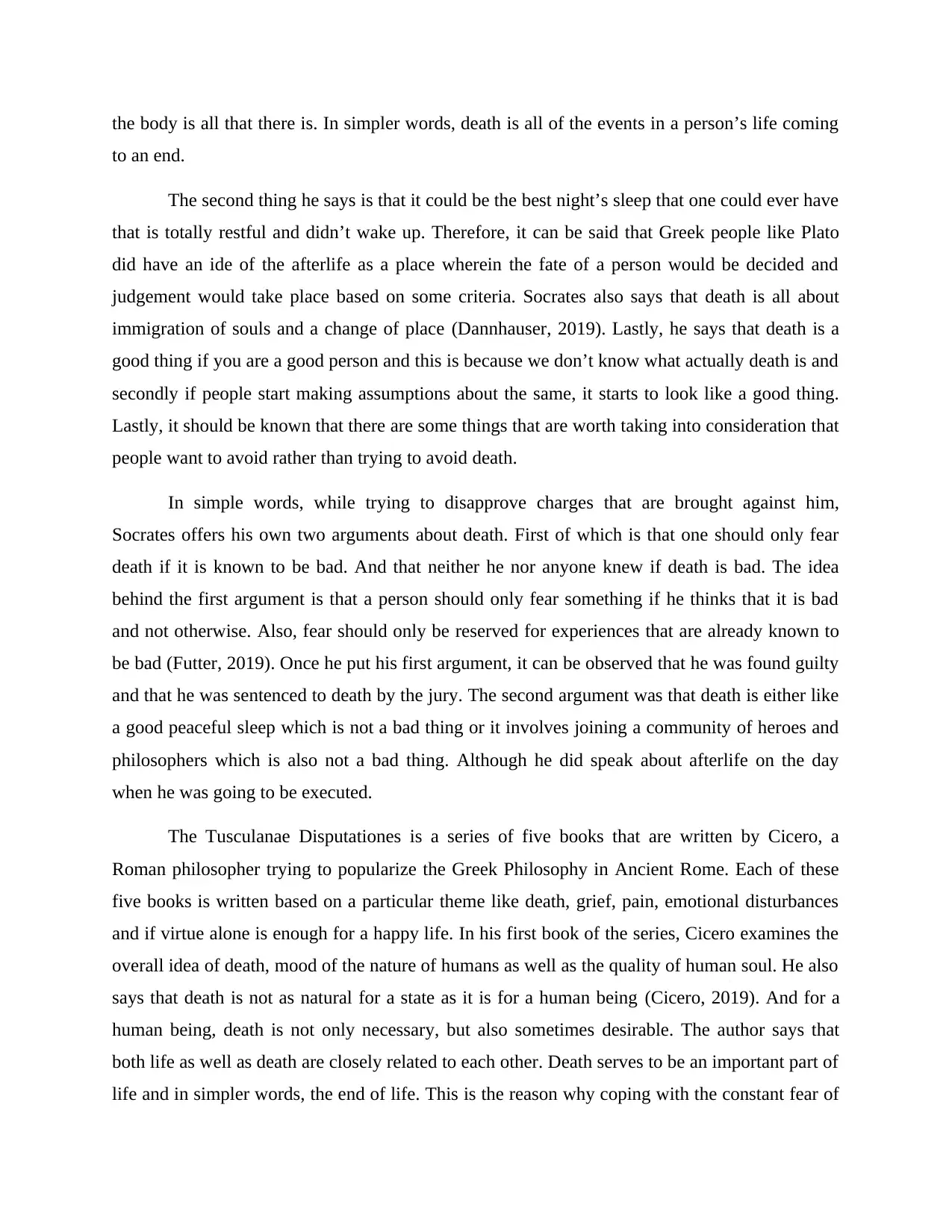
the body is all that there is. In simpler words, death is all of the events in a person’s life coming
to an end.
The second thing he says is that it could be the best night’s sleep that one could ever have
that is totally restful and didn’t wake up. Therefore, it can be said that Greek people like Plato
did have an ide of the afterlife as a place wherein the fate of a person would be decided and
judgement would take place based on some criteria. Socrates also says that death is all about
immigration of souls and a change of place (Dannhauser, 2019). Lastly, he says that death is a
good thing if you are a good person and this is because we don’t know what actually death is and
secondly if people start making assumptions about the same, it starts to look like a good thing.
Lastly, it should be known that there are some things that are worth taking into consideration that
people want to avoid rather than trying to avoid death.
In simple words, while trying to disapprove charges that are brought against him,
Socrates offers his own two arguments about death. First of which is that one should only fear
death if it is known to be bad. And that neither he nor anyone knew if death is bad. The idea
behind the first argument is that a person should only fear something if he thinks that it is bad
and not otherwise. Also, fear should only be reserved for experiences that are already known to
be bad (Futter, 2019). Once he put his first argument, it can be observed that he was found guilty
and that he was sentenced to death by the jury. The second argument was that death is either like
a good peaceful sleep which is not a bad thing or it involves joining a community of heroes and
philosophers which is also not a bad thing. Although he did speak about afterlife on the day
when he was going to be executed.
The Tusculanae Disputationes is a series of five books that are written by Cicero, a
Roman philosopher trying to popularize the Greek Philosophy in Ancient Rome. Each of these
five books is written based on a particular theme like death, grief, pain, emotional disturbances
and if virtue alone is enough for a happy life. In his first book of the series, Cicero examines the
overall idea of death, mood of the nature of humans as well as the quality of human soul. He also
says that death is not as natural for a state as it is for a human being (Cicero, 2019). And for a
human being, death is not only necessary, but also sometimes desirable. The author says that
both life as well as death are closely related to each other. Death serves to be an important part of
life and in simpler words, the end of life. This is the reason why coping with the constant fear of
to an end.
The second thing he says is that it could be the best night’s sleep that one could ever have
that is totally restful and didn’t wake up. Therefore, it can be said that Greek people like Plato
did have an ide of the afterlife as a place wherein the fate of a person would be decided and
judgement would take place based on some criteria. Socrates also says that death is all about
immigration of souls and a change of place (Dannhauser, 2019). Lastly, he says that death is a
good thing if you are a good person and this is because we don’t know what actually death is and
secondly if people start making assumptions about the same, it starts to look like a good thing.
Lastly, it should be known that there are some things that are worth taking into consideration that
people want to avoid rather than trying to avoid death.
In simple words, while trying to disapprove charges that are brought against him,
Socrates offers his own two arguments about death. First of which is that one should only fear
death if it is known to be bad. And that neither he nor anyone knew if death is bad. The idea
behind the first argument is that a person should only fear something if he thinks that it is bad
and not otherwise. Also, fear should only be reserved for experiences that are already known to
be bad (Futter, 2019). Once he put his first argument, it can be observed that he was found guilty
and that he was sentenced to death by the jury. The second argument was that death is either like
a good peaceful sleep which is not a bad thing or it involves joining a community of heroes and
philosophers which is also not a bad thing. Although he did speak about afterlife on the day
when he was going to be executed.
The Tusculanae Disputationes is a series of five books that are written by Cicero, a
Roman philosopher trying to popularize the Greek Philosophy in Ancient Rome. Each of these
five books is written based on a particular theme like death, grief, pain, emotional disturbances
and if virtue alone is enough for a happy life. In his first book of the series, Cicero examines the
overall idea of death, mood of the nature of humans as well as the quality of human soul. He also
says that death is not as natural for a state as it is for a human being (Cicero, 2019). And for a
human being, death is not only necessary, but also sometimes desirable. The author says that
both life as well as death are closely related to each other. Death serves to be an important part of
life and in simpler words, the end of life. This is the reason why coping with the constant fear of
Paraphrase This Document
Need a fresh take? Get an instant paraphrase of this document with our AI Paraphraser
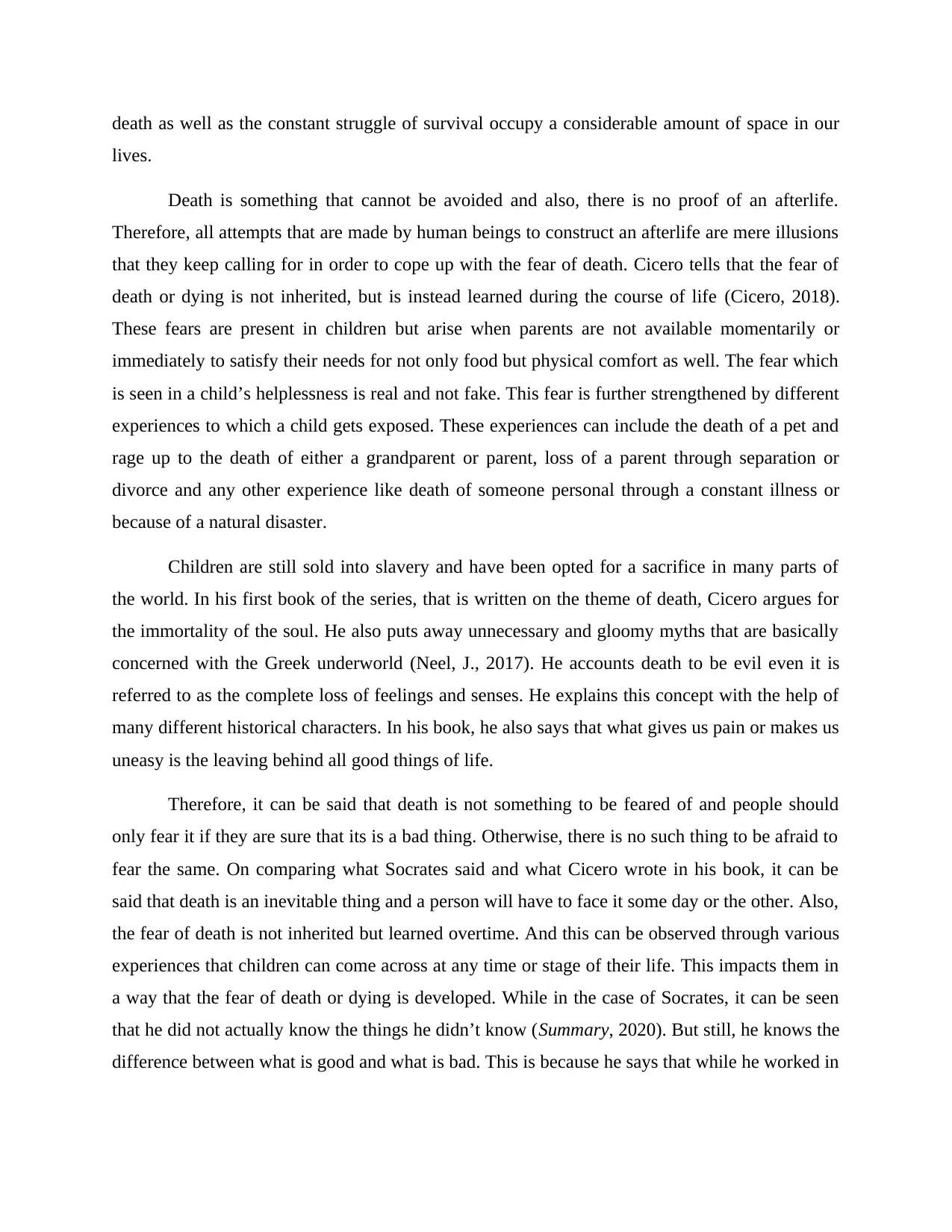
death as well as the constant struggle of survival occupy a considerable amount of space in our
lives.
Death is something that cannot be avoided and also, there is no proof of an afterlife.
Therefore, all attempts that are made by human beings to construct an afterlife are mere illusions
that they keep calling for in order to cope up with the fear of death. Cicero tells that the fear of
death or dying is not inherited, but is instead learned during the course of life (Cicero, 2018).
These fears are present in children but arise when parents are not available momentarily or
immediately to satisfy their needs for not only food but physical comfort as well. The fear which
is seen in a child’s helplessness is real and not fake. This fear is further strengthened by different
experiences to which a child gets exposed. These experiences can include the death of a pet and
rage up to the death of either a grandparent or parent, loss of a parent through separation or
divorce and any other experience like death of someone personal through a constant illness or
because of a natural disaster.
Children are still sold into slavery and have been opted for a sacrifice in many parts of
the world. In his first book of the series, that is written on the theme of death, Cicero argues for
the immortality of the soul. He also puts away unnecessary and gloomy myths that are basically
concerned with the Greek underworld (Neel, J., 2017). He accounts death to be evil even it is
referred to as the complete loss of feelings and senses. He explains this concept with the help of
many different historical characters. In his book, he also says that what gives us pain or makes us
uneasy is the leaving behind all good things of life.
Therefore, it can be said that death is not something to be feared of and people should
only fear it if they are sure that its is a bad thing. Otherwise, there is no such thing to be afraid to
fear the same. On comparing what Socrates said and what Cicero wrote in his book, it can be
said that death is an inevitable thing and a person will have to face it some day or the other. Also,
the fear of death is not inherited but learned overtime. And this can be observed through various
experiences that children can come across at any time or stage of their life. This impacts them in
a way that the fear of death or dying is developed. While in the case of Socrates, it can be seen
that he did not actually know the things he didn’t know (Summary, 2020). But still, he knows the
difference between what is good and what is bad. This is because he says that while he worked in
lives.
Death is something that cannot be avoided and also, there is no proof of an afterlife.
Therefore, all attempts that are made by human beings to construct an afterlife are mere illusions
that they keep calling for in order to cope up with the fear of death. Cicero tells that the fear of
death or dying is not inherited, but is instead learned during the course of life (Cicero, 2018).
These fears are present in children but arise when parents are not available momentarily or
immediately to satisfy their needs for not only food but physical comfort as well. The fear which
is seen in a child’s helplessness is real and not fake. This fear is further strengthened by different
experiences to which a child gets exposed. These experiences can include the death of a pet and
rage up to the death of either a grandparent or parent, loss of a parent through separation or
divorce and any other experience like death of someone personal through a constant illness or
because of a natural disaster.
Children are still sold into slavery and have been opted for a sacrifice in many parts of
the world. In his first book of the series, that is written on the theme of death, Cicero argues for
the immortality of the soul. He also puts away unnecessary and gloomy myths that are basically
concerned with the Greek underworld (Neel, J., 2017). He accounts death to be evil even it is
referred to as the complete loss of feelings and senses. He explains this concept with the help of
many different historical characters. In his book, he also says that what gives us pain or makes us
uneasy is the leaving behind all good things of life.
Therefore, it can be said that death is not something to be feared of and people should
only fear it if they are sure that its is a bad thing. Otherwise, there is no such thing to be afraid to
fear the same. On comparing what Socrates said and what Cicero wrote in his book, it can be
said that death is an inevitable thing and a person will have to face it some day or the other. Also,
the fear of death is not inherited but learned overtime. And this can be observed through various
experiences that children can come across at any time or stage of their life. This impacts them in
a way that the fear of death or dying is developed. While in the case of Socrates, it can be seen
that he did not actually know the things he didn’t know (Summary, 2020). But still, he knows the
difference between what is good and what is bad. This is because he says that while he worked in
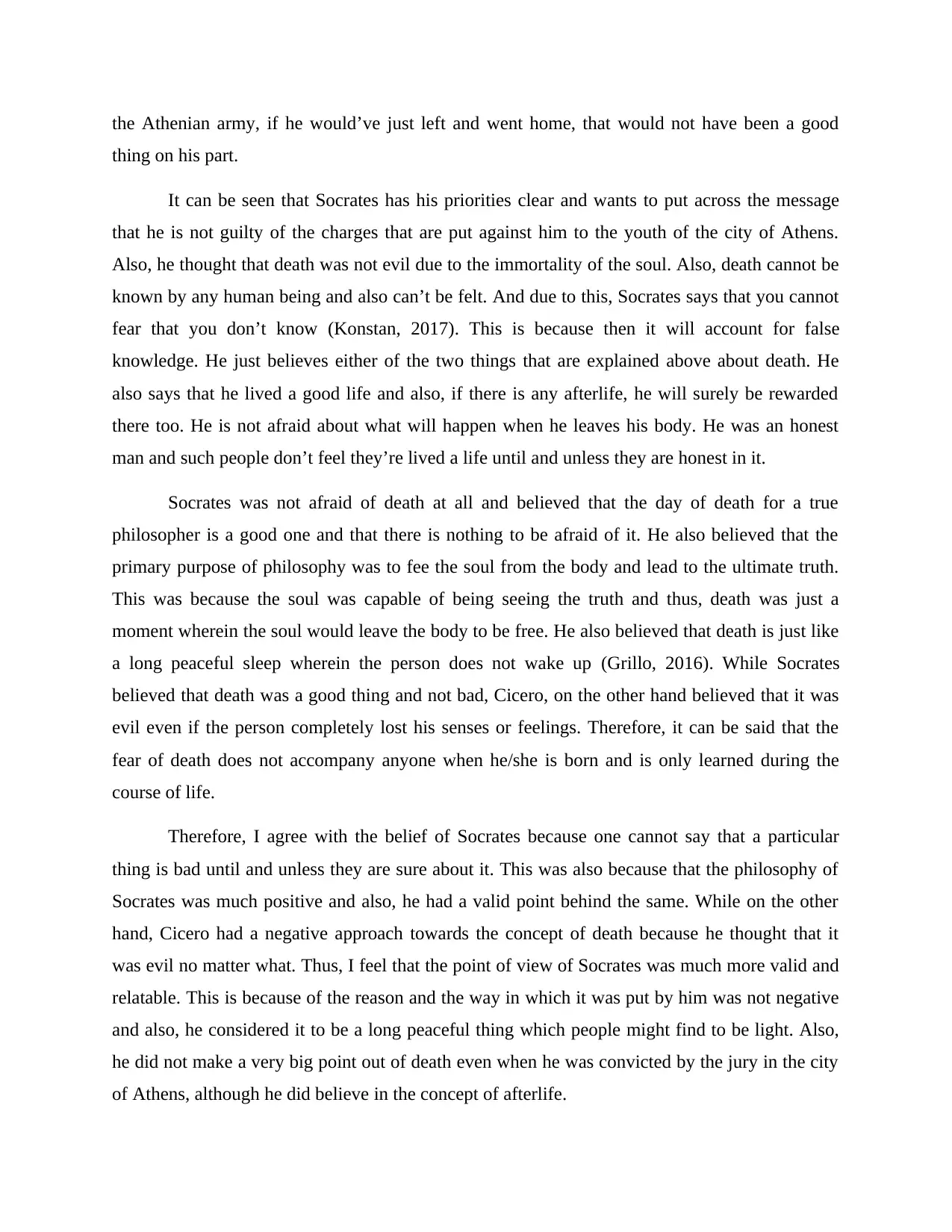
the Athenian army, if he would’ve just left and went home, that would not have been a good
thing on his part.
It can be seen that Socrates has his priorities clear and wants to put across the message
that he is not guilty of the charges that are put against him to the youth of the city of Athens.
Also, he thought that death was not evil due to the immortality of the soul. Also, death cannot be
known by any human being and also can’t be felt. And due to this, Socrates says that you cannot
fear that you don’t know (Konstan, 2017). This is because then it will account for false
knowledge. He just believes either of the two things that are explained above about death. He
also says that he lived a good life and also, if there is any afterlife, he will surely be rewarded
there too. He is not afraid about what will happen when he leaves his body. He was an honest
man and such people don’t feel they’re lived a life until and unless they are honest in it.
Socrates was not afraid of death at all and believed that the day of death for a true
philosopher is a good one and that there is nothing to be afraid of it. He also believed that the
primary purpose of philosophy was to fee the soul from the body and lead to the ultimate truth.
This was because the soul was capable of being seeing the truth and thus, death was just a
moment wherein the soul would leave the body to be free. He also believed that death is just like
a long peaceful sleep wherein the person does not wake up (Grillo, 2016). While Socrates
believed that death was a good thing and not bad, Cicero, on the other hand believed that it was
evil even if the person completely lost his senses or feelings. Therefore, it can be said that the
fear of death does not accompany anyone when he/she is born and is only learned during the
course of life.
Therefore, I agree with the belief of Socrates because one cannot say that a particular
thing is bad until and unless they are sure about it. This was also because that the philosophy of
Socrates was much positive and also, he had a valid point behind the same. While on the other
hand, Cicero had a negative approach towards the concept of death because he thought that it
was evil no matter what. Thus, I feel that the point of view of Socrates was much more valid and
relatable. This is because of the reason and the way in which it was put by him was not negative
and also, he considered it to be a long peaceful thing which people might find to be light. Also,
he did not make a very big point out of death even when he was convicted by the jury in the city
of Athens, although he did believe in the concept of afterlife.
thing on his part.
It can be seen that Socrates has his priorities clear and wants to put across the message
that he is not guilty of the charges that are put against him to the youth of the city of Athens.
Also, he thought that death was not evil due to the immortality of the soul. Also, death cannot be
known by any human being and also can’t be felt. And due to this, Socrates says that you cannot
fear that you don’t know (Konstan, 2017). This is because then it will account for false
knowledge. He just believes either of the two things that are explained above about death. He
also says that he lived a good life and also, if there is any afterlife, he will surely be rewarded
there too. He is not afraid about what will happen when he leaves his body. He was an honest
man and such people don’t feel they’re lived a life until and unless they are honest in it.
Socrates was not afraid of death at all and believed that the day of death for a true
philosopher is a good one and that there is nothing to be afraid of it. He also believed that the
primary purpose of philosophy was to fee the soul from the body and lead to the ultimate truth.
This was because the soul was capable of being seeing the truth and thus, death was just a
moment wherein the soul would leave the body to be free. He also believed that death is just like
a long peaceful sleep wherein the person does not wake up (Grillo, 2016). While Socrates
believed that death was a good thing and not bad, Cicero, on the other hand believed that it was
evil even if the person completely lost his senses or feelings. Therefore, it can be said that the
fear of death does not accompany anyone when he/she is born and is only learned during the
course of life.
Therefore, I agree with the belief of Socrates because one cannot say that a particular
thing is bad until and unless they are sure about it. This was also because that the philosophy of
Socrates was much positive and also, he had a valid point behind the same. While on the other
hand, Cicero had a negative approach towards the concept of death because he thought that it
was evil no matter what. Thus, I feel that the point of view of Socrates was much more valid and
relatable. This is because of the reason and the way in which it was put by him was not negative
and also, he considered it to be a long peaceful thing which people might find to be light. Also,
he did not make a very big point out of death even when he was convicted by the jury in the city
of Athens, although he did believe in the concept of afterlife.
⊘ This is a preview!⊘
Do you want full access?
Subscribe today to unlock all pages.

Trusted by 1+ million students worldwide
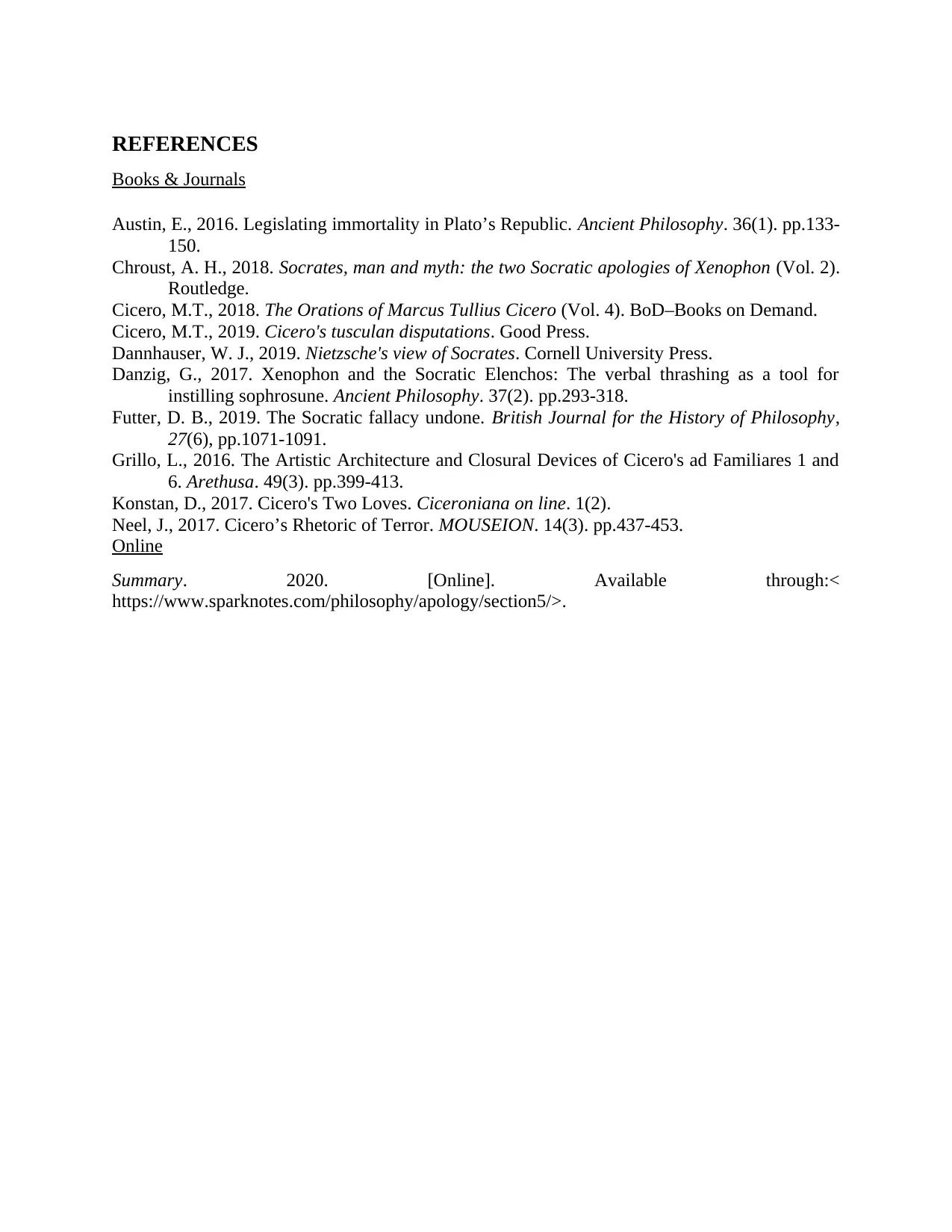
REFERENCES
Books & Journals
Austin, E., 2016. Legislating immortality in Plato’s Republic. Ancient Philosophy. 36(1). pp.133-
150.
Chroust, A. H., 2018. Socrates, man and myth: the two Socratic apologies of Xenophon (Vol. 2).
Routledge.
Cicero, M.T., 2018. The Orations of Marcus Tullius Cicero (Vol. 4). BoD–Books on Demand.
Cicero, M.T., 2019. Cicero's tusculan disputations. Good Press.
Dannhauser, W. J., 2019. Nietzsche's view of Socrates. Cornell University Press.
Danzig, G., 2017. Xenophon and the Socratic Elenchos: The verbal thrashing as a tool for
instilling sophrosune. Ancient Philosophy. 37(2). pp.293-318.
Futter, D. B., 2019. The Socratic fallacy undone. British Journal for the History of Philosophy,
27(6), pp.1071-1091.
Grillo, L., 2016. The Artistic Architecture and Closural Devices of Cicero's ad Familiares 1 and
6. Arethusa. 49(3). pp.399-413.
Konstan, D., 2017. Cicero's Two Loves. Ciceroniana on line. 1(2).
Neel, J., 2017. Cicero’s Rhetoric of Terror. MOUSEION. 14(3). pp.437-453.
Online
Summary. 2020. [Online]. Available through:<
https://www.sparknotes.com/philosophy/apology/section5/>.
Books & Journals
Austin, E., 2016. Legislating immortality in Plato’s Republic. Ancient Philosophy. 36(1). pp.133-
150.
Chroust, A. H., 2018. Socrates, man and myth: the two Socratic apologies of Xenophon (Vol. 2).
Routledge.
Cicero, M.T., 2018. The Orations of Marcus Tullius Cicero (Vol. 4). BoD–Books on Demand.
Cicero, M.T., 2019. Cicero's tusculan disputations. Good Press.
Dannhauser, W. J., 2019. Nietzsche's view of Socrates. Cornell University Press.
Danzig, G., 2017. Xenophon and the Socratic Elenchos: The verbal thrashing as a tool for
instilling sophrosune. Ancient Philosophy. 37(2). pp.293-318.
Futter, D. B., 2019. The Socratic fallacy undone. British Journal for the History of Philosophy,
27(6), pp.1071-1091.
Grillo, L., 2016. The Artistic Architecture and Closural Devices of Cicero's ad Familiares 1 and
6. Arethusa. 49(3). pp.399-413.
Konstan, D., 2017. Cicero's Two Loves. Ciceroniana on line. 1(2).
Neel, J., 2017. Cicero’s Rhetoric of Terror. MOUSEION. 14(3). pp.437-453.
Online
Summary. 2020. [Online]. Available through:<
https://www.sparknotes.com/philosophy/apology/section5/>.
1 out of 7
Your All-in-One AI-Powered Toolkit for Academic Success.
+13062052269
info@desklib.com
Available 24*7 on WhatsApp / Email
![[object Object]](/_next/static/media/star-bottom.7253800d.svg)
Unlock your academic potential
Copyright © 2020–2026 A2Z Services. All Rights Reserved. Developed and managed by ZUCOL.


